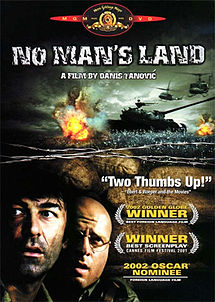 No man’s land is the area between enemy forces facing each other in a stalemate during a war, and as a general rule, no one enters no man’s land. This movie is set sometime in the Bosnian War between 1992 and 1995. It depicts half a day that includes two Bosnian soldiers that wander into the no man’s land between the trenches of the battling Serbian and Bosnian armies and are shot by the Serbian army; a Serbian soldier who is wounded in no man’s land while investigating; French sergeant Marchand of the UN forces who goes in to rescue these now three seriously wounded soldiers; a German soldier of the UN forces with a specialty in bombs who goes in to help the sergeant; and a female British reporter named Livingstone trying to get a scoop.
No man’s land is the area between enemy forces facing each other in a stalemate during a war, and as a general rule, no one enters no man’s land. This movie is set sometime in the Bosnian War between 1992 and 1995. It depicts half a day that includes two Bosnian soldiers that wander into the no man’s land between the trenches of the battling Serbian and Bosnian armies and are shot by the Serbian army; a Serbian soldier who is wounded in no man’s land while investigating; French sergeant Marchand of the UN forces who goes in to rescue these now three seriously wounded soldiers; a German soldier of the UN forces with a specialty in bombs who goes in to help the sergeant; and a female British reporter named Livingstone trying to get a scoop.
A novice Serbian soldier Nino along with another old soldier are given a dangerous mission by a superior officer to look into what looks like an invasion of the no man’s land by Bosnian soldiers, while the superior officer stays in a safe place. The old soldier thinks that the Bosnian soldier Cera who fell down in no man’s land is dead, and attaches a land mine under his body. The land mine is set to explode if a comrade of the Bosnian solder lifts his body. However, the old soldier is killed by another Bosnian soldier Čiki, who had been injured and hiding secretly, and Nino becomes injured. A struggle between the three people stuck in the trench—Cera who couldn’t move because of the land mine, and Čiki and Nino who are injured—inevitably ensues.
Čiki and Nino are enemies in the war, but they speak the same language, lived in the same town when there was peace, and have a mutual acquaintance. Their faces light up spontaneously when they talk about the woman they know in common. The two are trying to defeat each other and somehow escape from the trench, but when the other is in trouble, they unexpectedly show gentle sympathy towards each other.
This movie does not depict the background of the Bosnian War, but, by depicting concrete and typical individuals, this movie attempts to depict the essence of war—not only the Bosnian War—in an abstract way. At first in the trench, Čiki thinks the Serbian side started the war while Nino thinks the Bosnian side did, and they blame each other, but gradually they both start having doubts about their reasons for fighting each other, who started the war, and why they have to obey orders. Sergeant Marchand believes that the mission of a neutral UN officer is to, instead of doing nothing, help injured soldiers as much as possible, but his superior officer, who gives him orders from a distant and safe place, is indifferent and doesn’t wish to get involved in the situation. The reporter Livingstone believes it is her mission as a reporter to tell the world what is happening on the battlefield, and at the same time, is feverish in her ambition to get a scoop on the current situation that nobody else has; thus, she approaches the trench at the risk of danger. Her TV station coworkers in Great Britain receiving her footage ask of her, “Give us more juicy coverage”; when they watch the footage of the real life-and-death struggle between Čiki and Nino in the trench, though, they are stunned. When the footage of Livingstone and her crew reaches a global audience, the UN forces have to do damage control. In the end, the victims of politics are the soldiers on the front. Sergeant Marchand gazes sadly at his superior when the officer lies and leaves.
This movie depicts the different standpoints of Čiki, Nino, Cera, Sergeant Marchand, and the reporter Livingstone from the same distance so that the audience can feel sympathy for everyone. The question isn’t which side—Bosnia or Serbia—is the bad guy. One after another, moments of understanding appear—first between the soldiers of opposing armies, then between the neutral UN forces and journalist—and then disappear. This movie makes the audience pray, “I wish everyone stops fighting and can return home safely!!!” Against the audience’s prayer, the movie’s conclusion is too cruel and sad. However, the reality of the Bosnian War does not permit a simple happy ending. A simple happy ending would not honor the soldiers who were involved or died in the war. By watching this sad ending, the audience will certainly wish more deeply for peace. Such is the power of this movie.
